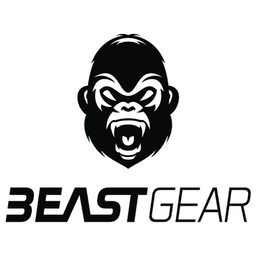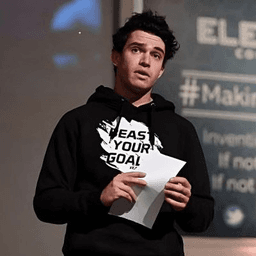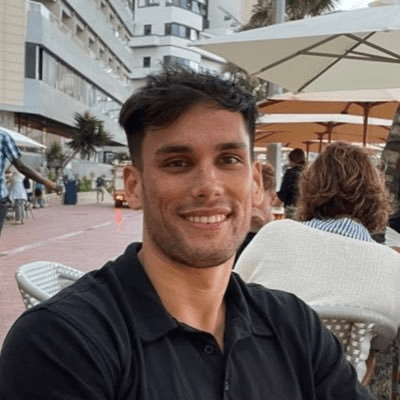How Ben Leonard Built Beast Gear Into a 7-Figure Fitness Brand Without Experience


Business Description
Table of Contents
Navigate through the case study sections
Executive Summary
Case Study Content
A Scientist's Unlikely Leap Into E-Commerce
Most new founders believe you need years of business knowledge or to be a serial entrepreneur to break into e-commerce. Ben Leonard proves otherwise. In 2016, Ben, an ecologist in Aberdeen, Scotland, was benched from the gym by a serious heart condition. Frustrated, restless, stuck at home, not exactly entrepreneurial conditions. But instead of sulking, Ben returned to an old idea: starting his own fitness brand inspired by the very gap he noticed as a consumer, quality equipment that didn’t cost the earth. Thus, Beast Gear was born, right from his bedroom desk and a modest pile of savings.
Turning Frustration Into a Brand
With absolutely zero background in online retail, Ben jumped right in. He researched obsessively, learning Amazon FBA and e-commerce on the fly, piecing advice from internet forums, YouTube, and any guide he could find. For the first product, the Beast Rope, a simple, high-quality jump rope, he pooled his own cash, added a small loan from his parents, and placed a 500-unit order with a manufacturer. This cost only about $2,500 to get off the ground. His gamble paid off. The thrill of his first Amazon sale cemented his obsession, and that initial rope would go on to be Beast Gear’s best-seller.
Obsessive Branding, Real Engagement
Ben wasn’t chasing just a generic Amazon niche. He wanted to build a real brand that customers would relate to and remember. Where lots of fitness brands showed only perfect, elite athletes, Ben positioned Beast Gear as inclusive, everyone welcome, every achievement celebrated. He immersed himself in his audience’s world by:
- Responding to customers’ Instagram posts with congratulations and discounts
- Creating demo videos on YouTube to teach proper technique
- Building a chatbot to deliver coupons, product guides, and handle questions
- Promptly addressing feedback or issues, building serious loyalty
Breaking Free From Amazon’s Competition
Unlike most Amazon sellers focused on quick arbitrage or copying products, Ben doubled down on expanding his presence. By 2017, with UK sales strong, he tackled the UK/EU shipping dilemma and put in the paperwork trivia most rivals avoided. Result: sales nearly doubled by accessing less competitive European Amazon marketplaces. Again, his method was to do the work nobody else wanted, setting up VAT, translations, adjusting logistics, and then reaping a whole new audience. Eventually, Beast Gear’s operations expanded into Europe, Australia, and the Middle East, but always with the UK as home base.
Lean Team, Smart Outsourcing
Beast Gear ran leaner than many would guess. At peak, Ben paid himself, quit his ecology job, and ran the company with three full-time freelancers (mostly customer support and social), one part-timer for graphics, plus external agencies for accounting and Amazon PPC. No bloated payroll. All remote, focused on clear results. This allowed immense flexibility and kept margins strong, one reason the business was so attractive at exit. For founders scared of complex hiring, this is proof that a small, nimble team can still drive 7-figure revenue if you focus on what matters.
Exit Timing, Why Ben Sold, and How He Maximized Value
Within three years, annual revenue topped $6 million, around $500,000 per month, 99% online, with 90–95% of sales through Amazon. But even as he eyed a US launch, Ben saw risk: heavy reliance on Amazon meant a sudden seller suspension could flatten his livelihood. At the same time, his wife was pregnant. Stability mattered. Friends highlighted the high multiples of Amazon exits for brands with growth potential. Ben started planning for an exit, with advice from his accountant and several brokers. But even sale negotiations had bumps: his first broker undervalued the business, but careful accounting caught the slip. After correcting, the right buyer showed up, Thrasio, now a household name in e-commerce aggregation. Beast Gear’s appeal: a strong loyal customer base, consistent growth, and an untapped US market for rapid scale. In October 2019, Ben closed the deal: roughly 60% cash upfront, 40% earn-out over two years, targets easily hit. In Thrasio’s hands, Beast Gear’s revenue jumped 60% more.
Life After Beast Gear: Brokering, Mentoring, and Staying in the Game
Ben’s tough sale process inspired EcomBrokers, a brokerage focused on real e-commerce M&A expertise (not clueless middlemen). He co-founded it with Allison Walker, the very accountant who'd spotted the broker’s calculations error. Knowing exactly what sellers need informs their approach: no fluffy promises, just real help to prep, value, and sell brands for max returns. Ben didn’t retire. He bought into several smaller brands, launched new products, and consults, always keeping a hand in running actual e-commerce businesses so he never loses touch with the problems his clients face. You can find him now teaching, mentoring, and helping others replicate his playbook.
Key Learnings for Founders
- Deep customer connection, not just by gathering five-star reviews, but by being present, human, and generous, even when the company was small.
- Brand first, not just product-first, storytelling and inclusivity over chasing quick sales.
- Data is a friend, simple, constant review/testing of your sales and messaging makes results easier to repeat.
- Expansion takes doing what others won’t, navigating paperwork and translating listings opens new, less crowded markets.
- Selling is a process, not an event, prepare for sale by keeping financials clean, understand your risks, and time your move for peak appeal.
- Small teams can achieve big wins, outsourcing, clear roles, and technology keep costs down and speed high when done right.
Conclusion
Ben Leonard transformed forced downtime into rapid business growth, focusing on customer experience, quality, and steady expansion. Off the back of Beast Gear, he parlayed his e-commerce lessons into new ventures and now helps the next generation of e-commerce brands find their own success. Don’t need to be an MBA grad with a round of venture capital to make a splash. Sometimes, all you need is a small bankroll, a bit of grit, and the discipline to play the long game.
Business Plan
Market Problem
The fitness equipment market is flooded with products that are either overpriced or lack quality, leaving consumers frustrated and…
See the full market problemSolution
Beast Gear addresses these issues by offering high-quality fitness products at reasonable prices, starting with the Beast Rope. The brand…
See the full solutionTarget Market
Fitness Enthusiasts
Individuals looking for quality workout gear that fits their budget.
Casual Gym-Goers
People who engage in fitness for fun and seek supportive brands that celebrate all achievements.
Competitors
MyProtein
Focused on affordable supplements, but lacks a strong equipment line that emphasizes community.
Rogue Fitness
High-quality equipment but tends to target serious athletes with higher price points.
Competitive Advantage
Beast Gear's primary competitive edge lies in its authentic branding that resonates with everyday consumers. Unlike many competitors who…
See the full competitive advantageSales and Marketing
Beast Gear employs a multi-channel marketing strategy that includes social media, email campaigns, and influencer partnerships to reach its…
See the full Sales and marketing planSuccess Milestones
Launch MVP
Publish a minimal but usable product and onboard 50 beta users.
First Sale
Achieve the first sale on Amazon to validate the product-market fit.
Key Takeaways
- 1Direct engagement with customers builds loyalty and repeat business, even on platforms as impersonal as Amazon.
- 2Brand-focused marketing, with an inclusive voice and a clear mission, helps products stand out in crowded markets.
- 3Scientific, data-driven decision-making can outpace gut instincts and reduce risk in all aspects of the business.
- 4Looking beyond your home market, even if it means paperwork and logistical challenges, can lead to fast growth by beating competitors to new regions.
- 5Smart outsourcing enables small teams to operate efficiently and keep operational overhead low while maintaining quality service.
- 6Preparing early and thoroughly for an exit boosts both valuation and sale-ability; a well-timed sale can be truly life-changing.
Key Facts
Tools & Technologies Used
Premium Content Locked
Subscribe to access the tools and technologies used in this case study.
Unlock NowHow to Replicate This Success
Premium Content Locked
Subscribe to access the step-by-step replication guide for this case study.
Unlock NowInterested in Being Featured?
Share your success story with our community of entrepreneurs.
Explore More Case Studies
Discover other inspiring business success stories

How to Scale a Shopify Store to $150K/Month with Google Shopping Ads
This case study reveals the exact steps Caomhan Daly used to generate $147K in monthly revenue from a simple, niche Shop...
Caomhan Daly Shopify Store

AdHive's $191K Profit with Facebook Ads
AdHive Media Buying Team tapped into consumer demand for dietary sweets in France, Germany, and the US. By running direc...
AdHive Media Buying Team

From Side Project to €10k MRR: The Stagetimer.io Story
Stagetimer.io began as a quick hack to solve clunky on-stage timing. Founder Lukas Hermann launched a free beta, gathere...
Stagetimer.io
